Every year I teach large and small businesses well over one hundred classes on government contracts. During these classes, I often review marketing materials that businesses plan to present to government procurement officers. There are some widespread mistakes I see in their federal and state government-focused capability statements, DSBS narratives, and websites. Here are the two most common mistakes:
Mistake #1: It’s All About You
Most marketing materials start with: “ABC is a small Women Owned (Veteran Owned, Minority Owned, etc.) business that sells such and such products and services. We take a collaborative approach with our clients to ensure blah, blah, blah. We deliver a top-quality blah, blah, blah.”
Government contracting officers read these marketing pieces every day, and they all look the same. One of your goals is to set yourself apart from the crowd. If you look like everyone else, the only thing they have to choose is price. You’ve probably heard people buy from people they know, like, and trust. One of the ways to get people to like you is to care about them. Instead of talking about you, talk about them first.
If it is a general Capability Statement, try something like this: “Your agency has an important mission. We are here to help. Federal and state procurement managers have a huge responsibility in meeting the needs of their agency, and you deserve vendors that make your job easier.” If you’re sending a marketing piece to a specific agency, mention their name in the mission of that agency. For example: “The USDA has an important mission protecting the American public…”
There is a time when you can talk about your company; it is after you let them know you care about them. Teddy Roosevelt, the 26th President of the United States, once said, “Nobody cares how much you know until they know how much you care.”
Make sure whoever is reading your marketing material knows that you care more about them than about their money.
Takeaway #1: Don’t say “we, we, we” to your potential customers; talk about them first. Stop focusing solely on your company and prioritize their needs.
Mistake #2: Forgetting Your Audience
People often forget who their audience is. You will have several potential customers in the government space: contracting officers, agency end users, large primes, other small businesses, and small business advocates. You will need to create marketing pieces that can be read by anybody, as well as those very specific to the person you’re sending it to, especially when you are targeting state and federal contract opportunities.
There are some generalities for most of your potential clients in the government market, especially contracting officers. Most of them are over 40 years old and are men. If, in the commercial market, you have been marketing predominantly to women and the colors for your marketing materials are pink and purple, they may be well received by your commercial market.
However, if you send a pink and purple capability statement to a career military officer, he may disregard you. That’s not right and it’s not fair, but it’s real. We always need to be thinking about our audience when we do marketing. Here’s an example of a hundred-billion-dollar company that forgot that principle. In April 2023, Bud Light decided to celebrate the gender change of Dylan Mulvaney.
There are two questions to ask here. From a social perspective, was it the right choice? From a marketing perspective, was it the right choice? The first question is not easily answered. If you spoke to 100 people, you might get 100 different opinions. The second question is very easy to answer—they forgot who their core customer was, so it was a terrible choice.
Most Bud Light drinkers are blue-collar workers. These people tend to be very conservative and do not support the LGBT agenda. As a result, they boycotted Bud Light. According to the New York Post, Anheuser-Busch’s company value went from $134 billion to $107 billion in 90 days. Most of us cannot even conceive how much $1 billion is, and yet, Anheuser-Busch lost $27 billion in stockholder value because of one decision.
Takeaway #2: Always remember who your client is and what’s important to them.
Government agencies need small businesses like yours to provide products or services so they can carry out their mission. If you would like to grow your business in the government market, GCA is here to help on that journey!
Guy Burns, CSP, CCM
VP Training, Government Contractors Association




Comments are closed